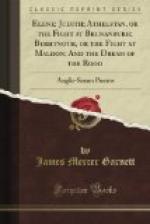The mingling of spears, the meeting of men, 50
The clashing of weapons, when on slaughter-field
In contest with Edward’s sons they contended.
Departed the Northmen in nailed ships,
Drear remnant of darts, on the sea of Dyng[5][?],
O’er the water deep Dublin to seek, 55
Back to land of the Erse, depressed in mind.
Likewise the brothers both together,
King and aetheling, were seeking their home,
West-Saxons’ land, exulting in war.
Behind them they let the corpses share 60
The dark-feathered fowl, the raven black,
The crooked-beaked, and the ashy-feathered,
White-tailed eagle enjoy the prey,
The greedy war-hawk, and the gray-clad beast,
The wolf in the wood. More corpses there were not 65
Upon this island ever as yet
Of folk down-felled before this time
With edges of sword, as books to us tell,
Sages of old, since hither from East
Angles and Saxons came to this land, 70
O’er the broad ocean Britain [once] sought,
Haughty war-smiths the Welsh overcame,
Earls eager for honor this earth acquired.
[1] Lit., ‘became slippery,’
Gn.; ‘babbled’ (as a brook), or
‘became
dark,’ Kr.; ‘streamed,’ Th.
[2] ‘Scattered,’ Th.
[3] Lit., ‘put to sleep.’
[4] Or, ‘He pressed ship on the sea’, ‘drove,’ Th.
[5] Gn. and W. take Dyng
as a proper name, but no one knows
who Dyng
was. Kr. leaves on dynges mere untranslated,
with the
remark: “ist unaufgeklaert.”
He thinks it refers
to some
bay in Ireland, from which the invaders set out, but
why may
it not be a name for the Irish Sea itself? Th.
translates
‘on the roaring sea,’ but adds ’quite
conjectural.’
BYRHTNOTH,
OR
THE FIGHT AT MALDON.
* * * * * * was broken.
Then bade he each youth his horse to forsake,
To hasten afar and forwards to go,
Be mindful of might, of mood courageous.
This Offa’s kinsman at once perceived
5
That the earl was unwilling faint heart to endure.
Then he let from his hands his lief[1] hawk fly,
His hawk to the holt, and to battle he stepped;
By that might one know that the knight was unwilling
To be weak in the war when to weapons he took.
10
By him too would Eadric, by his overlord, stand,
His chief in the fight; then forth gan he bear
His spear to the battle: brave spirit had he
The while that with hands he was able to hold
Shield and broad sword; his boast he fulfilled,[2]
15
When he ’fore his lord was bound to fight.




